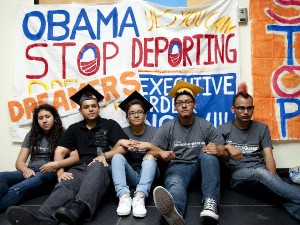US immigration bill hailed but faces tough hurdles

From left, Myisha Areloano, Adrian James, Jahel Campos, David Vuenrostro, and Antonio Cabrera camp outside of the Obama Campaign Headquarters in Culver City, Calif. in protest of President Obama’s immigration policies and in hopes of getting him to pass an executive order to halt discretionary deportation on Friday, June 16, 2012. AP FILE PHOTO
WASHINGTON, D.C.—As soon as the U.S. Senate introduced the much-anticipated immigration reform bill early Wednesday morning, key stakeholders in labor, business and immigrant rights communities hailed the measure as a significant and substantive step towards fixing a broken immigration system.
The bipartisan effort–something unheard of until after the 2012 presidential elections when President Obama won 70 percent of the Latino vote–has also raised expectations that immigration reform will become a reality this year.
The last major overhaul was in 1986 when three million undocumented immigrants received amnesty during the Reagan administration. Another attempt at reform failed in 2007 when labor and business couldn’t agree on provisions related to the recruitment of skilled and non-skilled workers.
Today, momentum is building to have this comprehensive immigration reform bill signed by President Obama before summer when Congress goes on recess.
Officially known as the “Border Security, Economic Opportunity and Immigration Modernization Act of 2013,” its major provisions call for strengthening the borders, reducing decades-long family-based visa backlogs within eight years, increasing the pool of green cards available to skilled and non-skilled workers, and forging a path to citizenship for the 11 million undocumented immigrants. It also allows so-called Dreamers, children of undocumented immigrants, to achieve citizenship within five years.
Criticisms and concerns
But even as immigrant rights advocates lauded the proposals put forward by the “Gang of Eight,” a group of four Republican and four Democratic Senators who worked across the aisle to draft the legislation, there are major and serious concerns.
Among them: heavy restrictions on acquiring citizenship, which could take up to 13 years; the elimination of sibling-based visas; and capping of the age of eligibility for married sons and daughters of U.S. citizens.
Asian Pacific American community leaders are particularly unhappy because it makes it harder for some families to petition for their adult married children over the age of 30.
“We are deeply concerned because this marks a radical departure from our longstanding American tradition of holding family unity at the core of our immigration system,” says Chris Punongbayan, acting executive director of the San Francisco-based Asian Law Caucus.
“The proposal needlessly asks immigrants to choose between jobs and their families.” Punongbayan is referring to a shift in U.S. immigration policy, which favors employment visas over family visas.
Weakened family reunification
“But the shift to high-skilled immigration should not invalidate the value of keeping families together,” says Jerry Clarito, legislative director of the National Federation of Filipino American Associations (NaFFAA) and an immigrant rights advocate based in Chicago, Ill.
Clarito notes that there are currently 423,449 Filipinos waiting for their visas–the highest among Asian Americans. Filipinos have also the longest waiting period–up to 22 years. Clarito also estimates that there are about 280,000 “out of status” Filipinos who face “a long and arduous path to citizenship, not to mention arbitrary security conditions.”
The Senate proposal would charge each applicant a penalty of $500 to file an application, another $500 six years later, and a further $1,000 before they could apply for permanent residence. After maintaining that provisional status, applicants will have to wait another three years before they could apply to become citizens.
“It doesn’t make sense that workers who have been here for years, paying their taxes and contributing productively to U.S. society have to go through these severe restrictions,” points out Lillian Galedo, executive director of Filipino Advocates for Justice.
“Why should they pay the price of a broken immigration system? There should be no further barriers to acquiring their political rights,” Galedo adds.
In light of the weakened family reunification provisions, the fate of S. 461, the Filipino Veterans Family Reunification Act of 2013, remains uncertain. Introduced by U.S. Rep Maize Hirono (D-HI), the bill is designed to fast-track the visa applications of family members of Filipino World War II veterans who have been waiting for many years to reunite with their spouses, sons and daughters.
Amendments proposed
The Senate Judiciary Committee has planned hearings on the measure starting Friday and Monday next week. Advocacy groups, like Asian American Justice Center and Filipinos for Family Reunification, are already developing strategies to strengthen the family provisions with amendments.
The proposed “merit-based system,” for instance, is one issue that advocates hope may be negotiated further because they are not sure it will be sufficient to continue the historical commitment to family reunification.
As proposed, the system awards points to applicants for factors such as education, length of employment, type of employment, family members in the U.S., and length of residence in the U.S.
Other proposed amendments include raising the age cap from 30 years old so that U.S. citizens can sponsor their adult children, and allowing LGBT couples and families to sponsor their loved ones.
“We will continue to engage our community and elected officials to ensure that the final bill will be inclusive and humane,” says Ed Navarra, national chair of NaFFAA.
“I call on all community leaders to collaborate with other Asian American and immigrant rights groups in mobilizing a grassroots movement to help all aspiring Americans achieve their dream of citizenship,” he adds.
###














